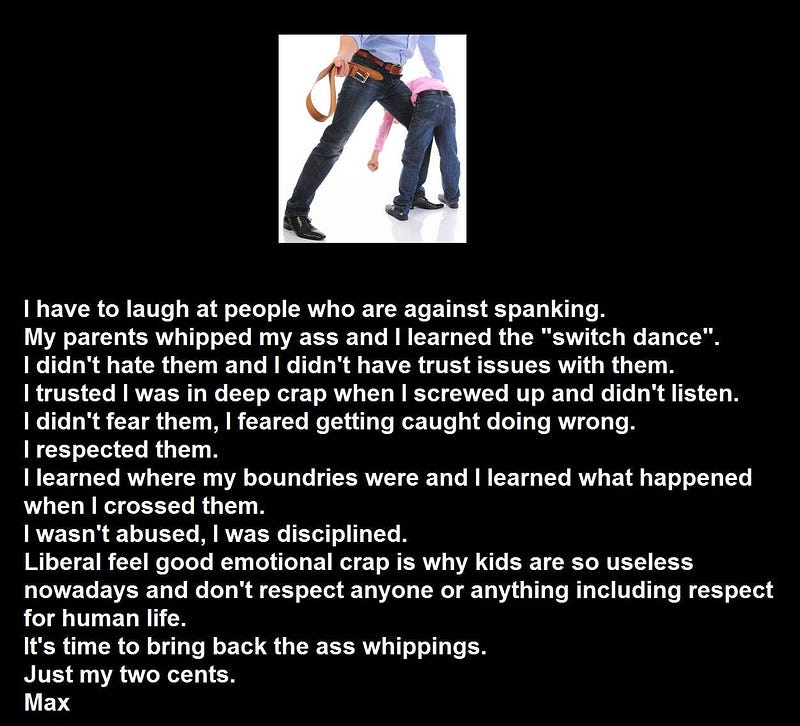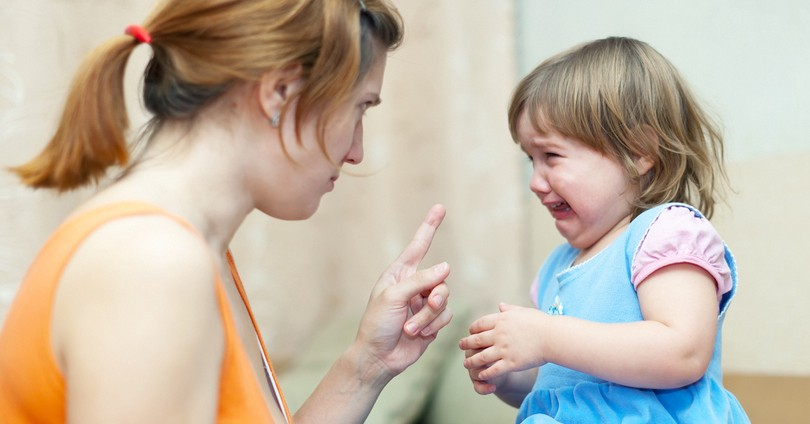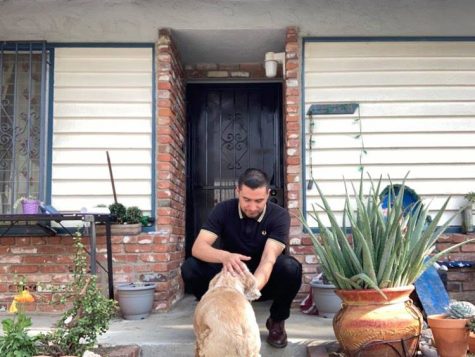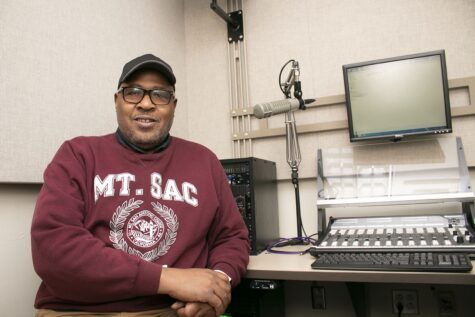Please, Don’t Spank Me!
Spare the rod and spoil the child. Paddle your kids and possibly raise their odds of developing mental illness.
A few Christmases ago, while at the mall searching for the perfect gift for my boyfriend, I witnessed a woman spank someone else’s child. The mall was so crowded there was barely enough space to walk without stepping on someone, as is normal for a mall during Christmas time in Southern California.
I was looking at a watch when I heard the loud screams of a child pierce the low-level hum of mumbles that came from other shoppers speaking to one another. I turned around, and through the sea of people, saw a small girl, probably two or three-years-old, trying to get her mother’s attention but she was busy talking to a sales associate. The mother ignored the girl as she continued to discuss whatever item she wanted to buy with the employee and the girl only cried louder as the minutes ticked by.
Eventually, I saw a young woman, who looked to be in her early twenties, roll her eyes as she walked up to the small child and smacked her hand against the girl’s behind. The child screamed and the mother, finally, took notice. After screaming a few obscenities at the young woman, the mother took her child by the hand and led her out of the store.
I was spanked as a child. It probably only happened a handful of times, and granted, it was never done by a stranger. In fact, if another adult had ever laid a hand on me in that way, my mother would have made sure they weren’t around to tell the tale today.
There are various studies that caution parents against the danger of hitting their child under any circumstance. I had never looked into the subject in detail, but I always figured that since I was spanked when I did something really bad as a kid and I turned out okay, that there was nothing wrong with spanking. My parents were spanked and they turned out okay. So, naturally, without doing any research of my own on the topic, I always just thought that if my kids ever did something that required a little extra discipline, a light tap on their behind would be okay, so long as it didn’t leave a mark.
Angel Montoya, a 22-year-old graphic design major, said that in addition to being spanked, his father had a belt that hung on the wall by the front door of his childhood home that he used when he made him especially angry.
“I’ve heard the stereotype with the Mexican mom throwing her chancla at kids when they mess up, but in my house, it was my dad. He was a good guy, but we didn’t mess with him.”
Montoya said that while he feels that he turned out alright despite his father’s disciplinary methods, he and his fiancée have agreed that they will not spank their 2-year-old son.
“Luca can be a handful and sometimes I really would just like to spank him, but I just keep thinking back to when my dad used his belt on me. At the time, I hated him for it. I don’t want my son to feel that way about me.”
According to The Primordial Violence: Spanking Children, Psychological Development, Violence and Crime by Murray A. Straus, children who are spanked by their parents are more likely to have negative feelings towards their parents as adults.
Scott Carmen, an auto-body shop owner, openly admitted to spanking his 13- year-old daughter when she was small.
“Caitlin was the type of kid who liked to test her limits,” Carmen said. “She was the type of kid when her mother would tell her not to touch a hot pot handle on the stove, she’d do it anyway. Always doing things she shouldn’t be, and no amount of time out would phase her. What else was I supposed to do? I didn’t want her to hurt herself.”
Ironically, Carmen’s answer to that was to choose a punishment that inflicted pain.
“As for all those studies that say kids who have been spanked grow up to have problems — people forget that correlation doesn’t mean causation. Yeah, the kids were spanked, but there’s probably a lot more that contributed to whatever problems that they have. The parents could’ve been drunks or abused them sexually or something. We don’t know.”
However, according to a study by the UNC School of Medicine, mothers who spank their children are three times more likely to abuse them in other ways. Cornell University wrote that most cases of child abuse began with the parents spanking their children.
So, while spanking may not necessarily be the only reason children may have psychological trouble as adults, it certainly does look as if it’s a contributing factor to other abuse which seems to contribute to mental illness.
MacKenna Tulsy, a 27-year-old teacher at Redding Middle School in Oklahoma and mother to 4-year-old Aislinn and 1-year-old Kai, said that she has mental illness in her family and suffers from depression herself.
“I don’t want to do anything to Aislinn or Kai that would make them feel like I want to hurt them or do anything that may even remotely contribute to them becoming anything but happy, healthy adults.”
Tulsy said that she doesn’t recall being spanked or hit as a child, so her depression is not a result of that, but she wants to take all precautions against her children developing the illness.
“I believe that everyone should be free to raise their children as they choose,” Tulsy said. “But it bothers me when I see my friends, or even strangers, spank their kids. It’s like, even if it doesn’t mess them up as adults, why would you even want to take that chance?”
According to the results of a recent Harris Poll, 81 percent of American parents take that risk. Four out of five parents in the United States believe that striking a child with an open hand on the behind is okay, as long as said parent shows restraint, does not lose their temper and does not leave a mark on the child.
Max Boome, a program director at WHGR radio networks, recently posted a photo on Facebook depicting a child bent over a belt-wielding man’s knee.

The photo, which has been shared over 200,000 times and has nearly 25,000 likes, was met with mostly supportive comments such as,“100 percent agree, couldn’t have said it better,” “Crack that leather belt!” and “Who ever disagrees with this your kids are gonna kill you because your [sic] a weak ass parent. People and kids need to know there [sic] places period and shits fucked up here.”
Conversely, Minnesota Vikings running back Adrian Peterson faced child abuse allegations and backlash from the NFL and various sponsors after reports surfaced in September 2014 that he had disciplined his 4-year-old son by hitting him with a switch. Peterson eventually agreed to a plea deal in order to avoid jail time for the offense.
Peterson recently said he “ won’t ever use a switch again” to discipline his children.
Psychology Today compares the act of spanking to assault, which is what the act of hitting an adult is considered. Hitting an adult is prohibited by law and will likely land the assailant in jail, but hitting a child, as long as it is your child, is revered and often praised. But many parents find it hard to stop with just “light spanking.” Their anger takes over and they end up striking their child over and over again with excessive force.
Megan Alcala, 10, recalled the only time her father ever spanked her. He was pressured by her grandmother to do so.
“I was like 5, I think, and I don’t remember what I did; probably something bad I’m sure and my dad put me in time out and my grandma was like ‘spank her’ in Spanish,” Alcala said.
Alcala said she had never been hit by her parents before.
“My dad and grandma went back and forth for a minute in Spanish, my dad saying how my mom didn’t want them to spank me, my grandma saying how she spanked my dad and it made him have respect for people. Then she said, ‘Se un hombre,’ which means ‘be a man.’ Then, Dad walked up behind me and hit my butt and my grandma said ‘Ese es mi chico.’” [That’s my boy]
Alcala said she remembers crying and being confused as to why her dad hit her. “I was afraid for awhile after that,” Alcala said.
The act of hitting a child as a form of discipline has been around since biblical times. The adage, “spare the rod and spoil the child” comes from Proverbs 13:24. The Bible goes so far as to say that those who “spare the rod” hate their children. Grace to You, a Christian organization, published an article that said Christians are under moral obligation to spank their children because the Bible praises it as a necessary part of parenting.
Spanking is more common in certain cultures than in others. Spanking occurs more routinely within the South, black culture, and among the poorly educated. According to various studies, and an article that appeared in Time magazine, spanking does not correct undesired behavior. Instead, it encourages children to lie and instills fear within them.
Fear, some parents would argue, is a good thing. Fear of a spanking curtails a child’s negative behavior, in theory. However, numerous recent studies have found that spanking may only be effective in preventing bad behavior in the short term. According to the U.S. National Library of Medicine, spanking only stops children prevents bad behavior in the immediate sense. Spanked children were more likely to repeat said offense days, weeks or months later when compared to children whose parents used an alternative punishment.
Alcala said that she does not remember the spanking as what it was intended to be — a punishment. Instead, she remembers it as the time the man she loved most in the world hit her.
“My dad never hit me again,” Alcala said. “He apologized once we left. But I’ll always have that in the back of my head. And every time I make him angry or do something I’m not supposed to, I wonder, for a split second ‘is he going to hit me again?’
In a world where everyone seems to have an opinion on how other people should discipline their children, it can be hard to sift through all the well meaning advice and opinions of experts, mommy bloggers, and people like me, who hope to be a parent someday and have taken an interest in the subject. Most of America believes that it is okay to spank your children. But, is it, really?
In an article in the Huffington Post, pediatrician Claire McCarthy recommends alternatives to spanking. McCarthy advises saying “no” (early and often), time-outs, taking toys and privileges away, grounding and rewarding good behavior.
Studies show that spanking children renders more harm than good. While effective in the short term, it fails time and time again in correcting long term behavior. The point of discipline is to correct behavior that is unwanted, negative or potentially harmful.
Using this particular technique that has been proven to be counterproductive can elicit fear, and encourages other problematic behavior, thus negating the original intention of the method in the first place and reinforcing that other alternatives would be better in the long run for both the parent and the child.













